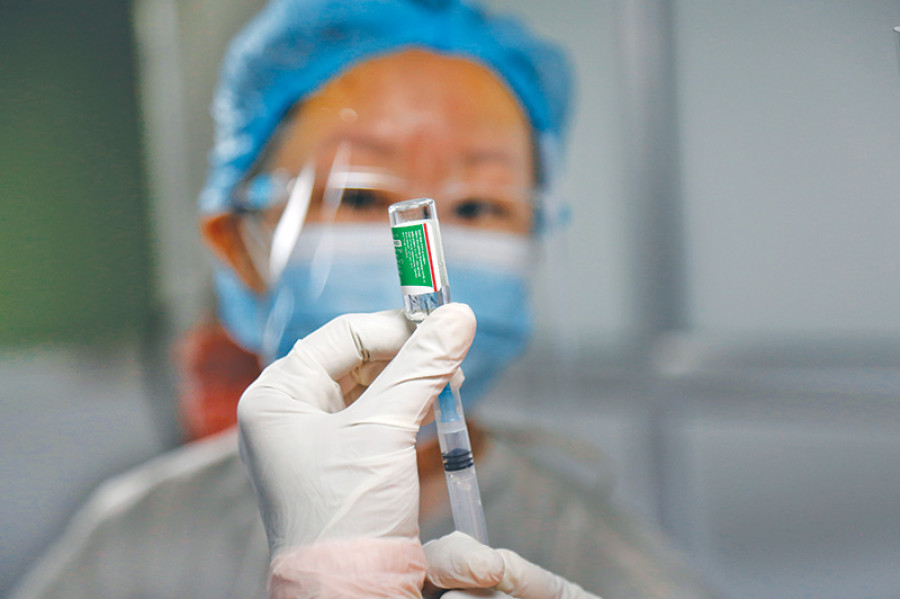Health
All above 55 to get Covid-19 vaccine in second phase
Officials say the government will soon secure sufficient doses to inoculate senior citizens under the campaign scheduled to start on March 7.
Arjun Poudel
People above 55 years of age are likely to be vaccinated against Covid-19 in the second phase of immunisation drive, as the government is set to secure sufficient doses of vaccines.
The Ministry of Health and Population has been preparing for the second phase of the immunisation drive at the community level from March 7.
“We will have sufficient vaccines to administer the first dose to the people above 55,” Dr Shyam Raj Upreti, coordinator of Covid-19 advisiory committee, told the Post. “We will buy two million doses from India and the World Health Organization will also provide 2.25 million doses.”
The government already has in its stock around 400,000 doses of the Covishield vaccine provided by India under grant assistance while another 500,000 pledged by China is also expected to arrive soon.
Besides, the government has also approved advance payment to procure two million doses of Covishield vaccine from India.
Covishield vaccine was developed by the University of Oxford and British-Swedish multinational pharmaceutical company AstraZeneca and it is being produced by the Serum Institute of India.
A Cabinet meeting on Tuesday decided to make 80 percent of the payment in advance to the Serum Institute of India to secure two million doses of Covishield jabs.
Meanwhile, the Department of Drug Administration has granted emergency use authorisation to a Covid-19 vaccine developed by the Beijing Institute of Biological Products Co Ltd (BIBP) in China under Sinopharm.
China has pledged to provide 500,000 doses of Sinopharm’s vaccine to Nepal under grant assistance.
With the vaccines likely to be secured soon, authorities are confident that there won’t be any shortage of vaccines for the people in the vulnerable age group.
According to Upreti, the number of people above 55 years is around 3.7 million.
“Once the people above 55 years get the first dose of the vaccine, we plan to administer the second dose after a gap of three months,” said Upreti.
Health Ministry officials said they were currently in the middle of the third round of the first phase of the immunisation drive while preparations for the second phase of the drive were taking place simultaneously.
“We will start provincial level training from Friday. We will also conduct district and municipality level training before launching the second phase of the drive,” Dr Jhalak Sharma, chief of Child Health Section at the Family Welfare Division under the Department of Health Services, told the Post.
Sharma added since there have been no incidents of serious side effects from the vaccine so far, vaccine hesitancy is expected to be far less in the second phase of the drive.
Around 300,000 people have taken the jab against Covid-19 as of Wednesday. Sharma said the ongoing vaccination programme will be extended till Saturday.
In the first phase, the Health Ministry had planned to immunise 430,000 people, including health workers, staff members of health facilities, female community health volunteers, sanitation workers, security personnel deployed for the management of bodies of people infected with the coronavirus and elderly people residing in old age homes. But only 184,857 people took the jab.
The ministry decided to vaccinate journalists and staff members serving in diplomatic missions in the second round. And in the third round, it decided to vaccinate around 300,000 people serving in financial institutions, health workers, journalists serving outside Kathmandu Valley and staff members of local governments.
The Health Ministry has also asked the people who did not get the vaccine in the first round to take the jab in the third round.
Despite the vaccine hesitancy, Sharma claimed that 82 percent of the target group were immunised in the first round.
Meanwhile, public health experts have said that authorities concerned should continuously immunise people as per the priority list prepared by experts’ panel.
“We all know that vaccines do not come at once for all the population,” Dr GD Thakur, former director at the Epidemiology and Disease Control Division, told the Post.
“Authorities concerned should follow the priority list and administer the vaccine accordingly.”
According to Thakur, awareness drive is crucial for the success of any health programme, so the authorities should use all available means to build a positive environment for the immunisation drive.
Health experts have also requested the authorities to immunise teachers, as most of the schools throughout the country have already started in-person classes.
“Teachers who come in contact with hundreds of children could be infected and there is a risk of them infecting the children,” Dr Binjwala Shrestha, assistant professor at the Institute of Medicine, told the Post. “ I wonder why authorities are not keeping the teachers on the priority list.”




 16.12°C Kathmandu
16.12°C Kathmandu















